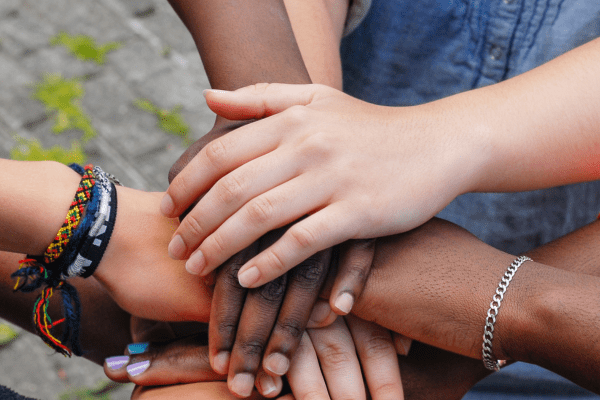Disclosure :: This post is sponsored by Trisha Bottello, a local licensed professional therapist, that specializes in therapy for teens and the grown ups that love them.
Helping Your Tweens & Teens Build Healthy Friendships
 As a therapist working with teens, I see so many struggles with friendships: making friends, keeping friends, navigating drama and friend groups. The list goes on. It’s a whole new world out there for our teens on social media, where many feel pressured to stay tuned-in at all times for FOMO and are addicted to the allure. But social media is a challenging place to cultivate meaningful, trustworthy friendships. Teens often use social media in attempts to resolve conflict by gossiping and blocking. Even when intentions are pure, communication over social media is easily misconstrued and misinterpreted.
As a therapist working with teens, I see so many struggles with friendships: making friends, keeping friends, navigating drama and friend groups. The list goes on. It’s a whole new world out there for our teens on social media, where many feel pressured to stay tuned-in at all times for FOMO and are addicted to the allure. But social media is a challenging place to cultivate meaningful, trustworthy friendships. Teens often use social media in attempts to resolve conflict by gossiping and blocking. Even when intentions are pure, communication over social media is easily misconstrued and misinterpreted.
Some of the most important developmental tasks in adolescence revolve around the social brain- learning how to be in relationship with others and developing a healthy relationship with yourself. (Developmental task = figuring it out. Figuring it out = trial and lots of error). Helping your teen navigate their social scene is one of the tallest parenting orders out there. Here are a few tips I’ve found useful in helping teens cultivate healthy friendships:
Model healthy friendships: Set the example for what it means to be a good friend. Make a point to have your child hear you saying nice things about your own friends. Share about a time a friend did something kind and how it felt. Point out positive attributes in your child’s friends and engage in conversation about what makes them a great friend, too.
Discuss different types of friendships: Help your child understand not everyone’s gonna be their ride-or-die. That friend you clown around with in science class is just as golden as the BFF you facetime with till 3am. Teach your child to value friends on all ends and in-betweens of the friendship spectrum.
Be on your best boundaries: Connection expert, Brené Brown, says healthy boundaries are a prerequisite to healthy connection. Adolescence is the perfect time for learning how to set and respect personal boundaries. This includes lessons on appropriate sharing versus over-sharing, knowing how to say no (and that no means no), as well as standing up for what you need and believe in.
Know what makes you glow: The teenage brain is on fire developing a sense-of-self and sense of self-in-relation to others. Helping your child develop a positive self-concept is paramount. So what if you’re not the life of the party!? Wallflowers are just as intriguing. OK, your bestie’s the funny one? Maybe you’re the great listener who everyone spills the tea to. Help your teen tap into their social superpower.
Nurture positive & promising connections: Sometimes teens need tangible advice on how to initiate and sustain relationships. I often assign “social homework” and advise that it’s just as important as academic homework. Examples include: craft a few questions and conversation starters to have prepared, start an inclusive group chat, offer a compliment to someone, or set a reminder to check-in on a friend who needs support. Friendships built on “talking bad” about others is compelling, but not cool. Help your teen find kind and compelling ways to nurture healthy connections.
Communication and Conflict Resolution Skills: Teach your teen how to recognize and share their feelings appropriately. Teach them how to take accountability and apologize skillfully. Practice body language and facial expressions. Use your “I Statements”. Discuss the difference between conflict and bullying, and teach conflict resolution skills. And for the love of all things holy encourage them to check and double check text responses before hitting send!
Normalize negative habits (BUT PRIORITIZE FIXING THEM!): When I work with teens, I tell them, “I’m team ‘you,’ even if you are the one that started the drama.” And I mean it! The primary tasks of adolescent brain development include risk taking and relationship building, which mean making mistakes and being overly obsessed with your social realm, and often manifests in mess. With support from trusted adults, teens can reflect on negative habits- such as gossip and all-or-nothing thinking- and learn more productive ways to engage in their social realm.
Be balanced: Be sure your teen has more than one outlet for interacting with friends but also for nurturing their own interests.
Know the signs and keep an open door: Discuss the signs of healthy and unhealthy relationships with your child and let them know they can come to you with any questions or concerns. Keep an open door and an open mind to keep your teen talking about the important stuff. And keep an eye out for signs that your child might need professional help.
Building meaningful friendships in adolescence has life-long benefits. The teenage brain is more impressionable than ever and it’s the perfect time to teach social skills and coping strategies. A little compassion and guidance can go a long way in helping your teen develop enriching friendships. Parenting teenagers is not for the faint of heart, y’all. But teens are resilient! And psst – so are you.
Do you need additional help with raising resilient tweens & teens who are capable of building healthy friendships? Contact Trisha Bottello to learn more about the services she provides including (but not limited to) individual therapy, school consultations, parent coaching, child- parent restorative work and more!
About the author:
Trisha lives here in NOLA with her two daughters, one cat, and usually some compilation of their little blended family. She’s worked with families and adolescents for over 15 years  and genuinely loves helping people make connections, find solutions, and feel better. With a focus on relational wellness, she specializes in therapy for teens, couples counseling for parents, co-parenting through divorce, and blended families.
and genuinely loves helping people make connections, find solutions, and feel better. With a focus on relational wellness, she specializes in therapy for teens, couples counseling for parents, co-parenting through divorce, and blended families.
You can find her here, or, when she’s not in session, probably drinking too much coffee, trying to practice what she preaches about self-care and make it to a yoga class. Trisha will be offering virtual support groups for teens this July and August to help them prepare for “Being Your Best Social Self” and practicing “Social Media Self Care” ahead of the 2023-24 school year. Please reach out if you’re interested in support for yourself, your family, or your teen!
















